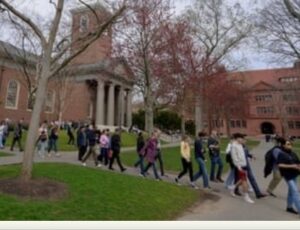Trump Administration Stops Student Visa Interviews, Plans Sweeping Social Media Scrutiny
Trump Administration Stops Student Visa Interviews, Plans Sweeping Social Media Scrutiny

In a dramatic shift that could upend international education in the U.S., the Trump administration has ordered American embassies around the globe to immediately stop scheduling student and exchange visitor visa interviews, pending new guidance on enhanced security screenings.
According to a confidential State Department cable issued Tuesday, U.S. consular offices have been directed to pause appointments for F, M, and J visa categories—those granted to international students and cultural exchange participants—until further notice. The move signals the administration’s intent to expand its surveillance of applicants’ online activity before granting entry to the country.
“The department is conducting a review of existing operations and processes for screening and vetting of student and exchange visitor visa applicants,” the cable reads, adding that new rules will soon mandate broad social media vetting for all such applicants, regardless of prior flags or political activity.
Social Media Under the Microscope
This policy expansion builds on earlier directives aimed at students involved in pro-Palestinian demonstrations, under which consular officers were instructed to scour applicants’ social media for signs of alleged extremism. Even seemingly benign posts—such as support for humanitarian causes—have reportedly come under scrutiny.
In those cases, officers were told to capture and archive screenshots of “potentially derogatory content,” even if such material was later deleted. Now, this approach is set to be applied universally across student visa applications, with platforms like TikTok, Instagram, and X (formerly Twitter) being combed for any posts deemed a potential national security threat.
The Trump administration has tied the initiative to its broader push against antisemitism, though critics warn it could easily become a tool for ideological targeting and censorship.
Massive Impact on Higher Education
The directive comes at a critical time for U.S. universities, many of which depend on international students not only for academic diversity but also financial sustainability. Foreign students contributed nearly $43.8 billion to the U.S. economy in the 2023–2024 academic year, supporting over 378,000 jobs, according to data from NAFSA: Association of International Educators.
With over one million foreign students currently studying in the U.S., the freeze on visa interviews could dramatically delay processing times and discourage new applicants—especially as universities already face declining international enrollment and increasing global competition.
Visa Revocations on the Rise
Senator Marco Rubio recently disclosed that “probably thousands” of visas have already been revoked under the administration’s intensified screening program, a sharp rise from the 300 reported earlier this year. “We probably have more to do,” he told fellow lawmakers, signaling that the clampdown may continue to widen.
As institutions brace for the fallout, critics argue the policy could alienate promising students, weaken academic exchange, and further isolate the U.S. on the global education stage.
TRENDING SONGS
 NPMA Appeals to Nigerian Government for Compensation After Lagos Market Fire
NPMA Appeals to Nigerian Government for Compensation After Lagos Market Fire
 Rest Every Four Hours, FRSC Issues Safety Guide for Fasting Motorists
Rest Every Four Hours, FRSC Issues Safety Guide for Fasting Motorists
 NNPC Boss Ojulari Bags UK Energy Institute Fellowship
NNPC Boss Ojulari Bags UK Energy Institute Fellowship
 Shock in Anambra: Bride Disappears Moments Before Wedding
Shock in Anambra: Bride Disappears Moments Before Wedding
 Nigerian Woman Returns ₦330 Million Accidentally Credited to Her Account
Nigerian Woman Returns ₦330 Million Accidentally Credited to Her Account
 APC Don Reach Morocco?’ VeryDarkMan Reacts to Seyi Tinubu Poster
APC Don Reach Morocco?’ VeryDarkMan Reacts to Seyi Tinubu Poster
 Bride Breaks Down in Tears as Wedding Meals Were Kept Secretly While Guests Go Home Hungry
Bride Breaks Down in Tears as Wedding Meals Were Kept Secretly While Guests Go Home Hungry
 Odogwu by Day, Robber by Night: How Marriage Joy Turned Into Tragedy
Odogwu by Day, Robber by Night: How Marriage Joy Turned Into Tragedy
 Nigerian Officials Allegedly Pocket N4–6B Weekly Through Smuggling Cartels at Seme–Badagry Border
Nigerian Officials Allegedly Pocket N4–6B Weekly Through Smuggling Cartels at Seme–Badagry Border
 Ahmad Yerima: Naval Officer to Face No Sanctions After Clash with Wike – Matawalle
Ahmad Yerima: Naval Officer to Face No Sanctions After Clash with Wike – Matawalle
Share this post with your friends on ![]()













